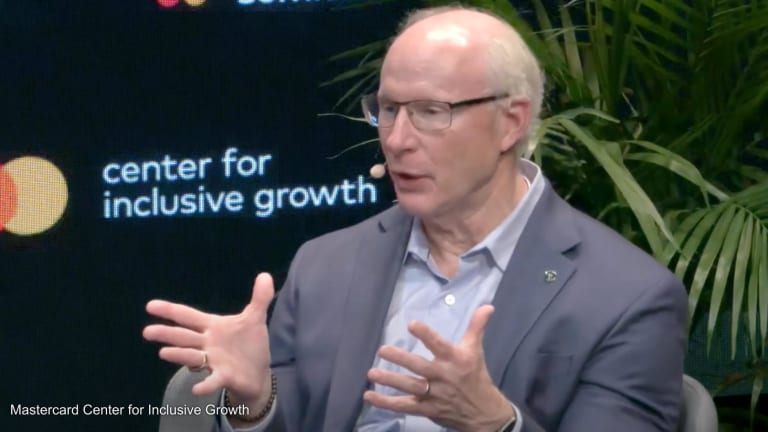
Huthaifa loves bees. So much so that in 2018, he decided to keep three boxes of them on the roof of his house, dreaming that he would become one of Jordan’s top honey producers and exporters. His ambitions extended way beyond this start-up, but how could a young beekeeper turn his passion into a successful business?
With a grant from the Resilient Futures program, Huthaifa’s aspirations to turn his passion into a business started to become reality. Since 2019, Huthaifa’s business has been supported by the Resilient Futures program — hosted by the International Rescue Committee, or IRC — through both grants and access to markets to sell his products. Now, six years later, Huthaifa has become a mentor for other beekeepers in his community and across the world. Huthaifa’s story is just one of thousands — and a powerful illustration of what’s possible when aid is responsive, long-term, and rooted in local contexts.
Helping young entrepreneurs find their feet
This World Humanitarian Day, there are over 120 million people forcibly displaced across the globe. Among them is a growing generation of young people grappling with the effects of conflict and crisis. In 2020, 11% of migrants were aged between 15 and 24, and that number has only risen since. Many of these young people live in cities — arriving either alone or with their families with hopes of rebuilding their lives. Instead, they often face high unemployment, social stigmatization, and difficulties integrating into their new communities.
That’s why in 2017, with the support of the Citi Foundation, the IRC launched Resilient Futures, a program built on a simple premise: Economic opportunity is essential for long-term recovery. Over the past eight years, this initiative has helped conflict-affected urban youth across seven countries — Greece, Nigeria, Jordan, Germany, Cameroon, Lebanon, and Mexico — to get back on their feet with business and employment opportunities.
The program provides support and resources to young entrepreneurs who take part in mentoring and training initiatives and learn about the needs of their local markets. Entrepreneurs with promising business plans receive a grant to help cover the startup costs of their businesses. Other participants are introduced to mentors and directed toward helpful resources. The program helps create financial independence while also contributing to participants’ communities.
To date, Resilient Futures has trained over 3,200 people through the IRC’s Learn to Earn curriculum, provided nearly 1,600 young people aged 18-35 with business mentorship and/or grants to expand their businesses, and supported more than 1,600 individuals to enter the job market. Through community events, almost 2,800 people have engaged in conversations that build communities in the places they now call home. As the program comes to a close, we reflect on eight years of supporting businesses, youth, and communities, with all its challenges, successes, and inspiring stories.
Throughout these eight years, we learned that innovative, smart long-term initiatives such as Resilient Futures that combine flexible funding with technical expertise result in impact at a much larger scale. By prioritizing interventions based on where support is needed most, we can have the greatest impact and yield the most transformative results. As humanitarian needs deepen (especially in fragile and conflict-affected states where the majority of the world’s extreme poor now live), aid budgets shrink, and remaining funds are often stretched thin across many different priorities, collaborations between the public and private sector play an integral role in helping some of the world’s most marginalized get back on their feet.
Embracing innovative approaches
We hope that Resilient Futures can serve as a model for impact and for innovative public-private collaboration that amplifies what well-designed aid can achieve: delivering lifesaving assistance while laying the foundation for longer-term recovery. In this new era of aid, forging those collaborations and implementing the following approaches can lead to greater impact:
• Adapt to the local context: We all want to scale what works. But no two cities — or refugees — are the same. By understanding local dynamics, implementers can challenge their own assumptions and design economic empowerment programs that focus on what the local economic environment is best suited for, whether that be entrepreneurship or employment.
• Invest in research: Generating and sharing evidence is not a luxury, it’s a necessity. Through Resilient Futures, research uncovered the disproportionate impact of COVID-19 on refugee entrepreneurs, and the possibility that refugees are not impacted by the work and progress achieved in support of the U.N. Sustainable Development Goals, or SDGs. Thought leadership such as this goes beyond program strategy and in turn feeds into global influence — helping inform and enhance the wider ecosystem for displaced populations.
• Fund multilocation, multiyear solutions: When aid is delivered through multiyear, multilocation programs, it becomes agile enough to respond to unforeseen crises and robust enough to scale. The long-term, multilocation nature of Resilient Futures enabled the team to adapt quickly to rapidly changing contexts — from developing small business support to emerging agricultural enterprises in North Lebanon to combat food security to adapting programming to support rapid labour market integration for Ukrainians in Germany.
As more and more young people move from rural to urban areas, World Humanitarian Day offers a poignant moment to reflect on the most innovative ways to help them rebuild their lives in new locations. Let’s use this day to recognize the full potential of programs that put localization, flexibility, and a solutions-oriented approach at the heart. But more than that, let’s work to build a world where stories such as Huthaifa’s are the norm, and young people everywhere can achieve their dreams and potential.
For more information about Resilient Futures, visit rescue.org/uk/topic/resilient-futures.








